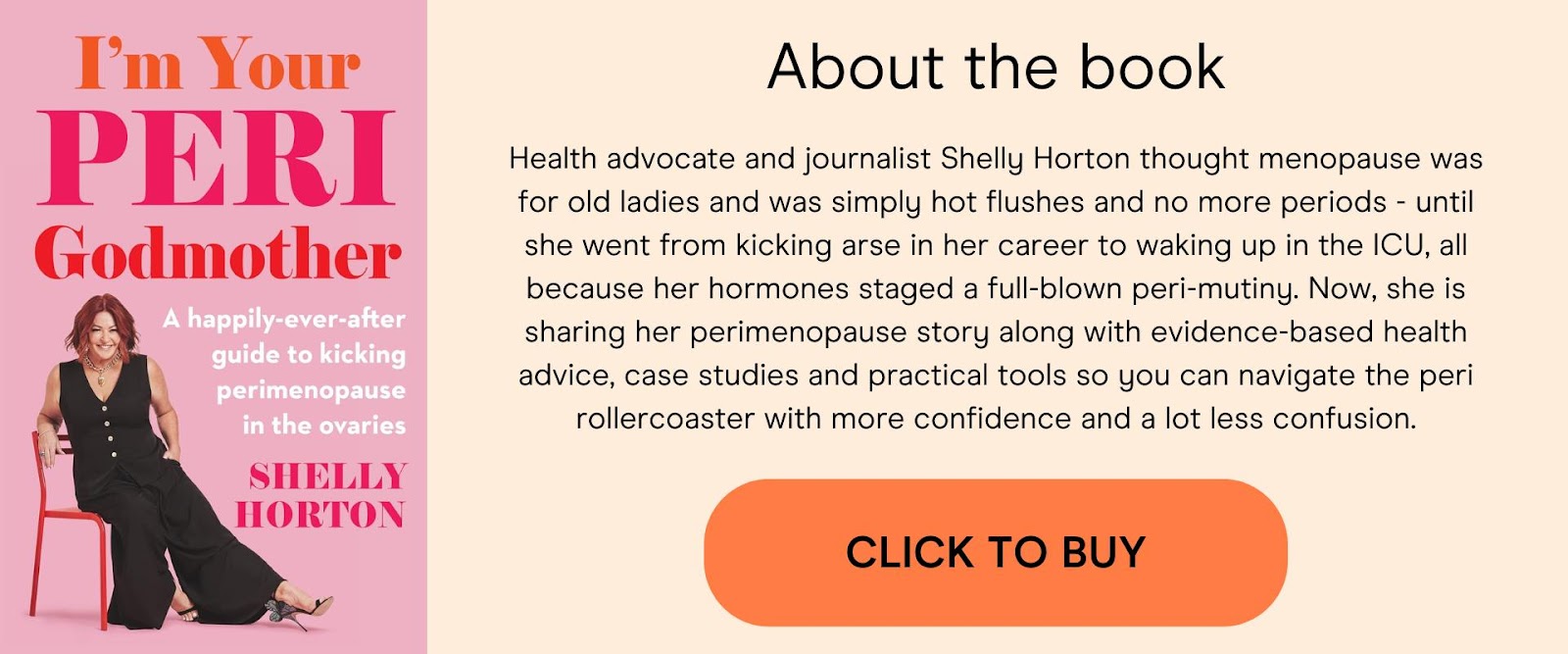Health
5 things Dr Ginni Mansberg wants you to know about brain fog

In this extract from Shelly Horton’s I’m Your Peri Godmother Dr Ginni Mansberg gets real about why your midlife memory glitches aren't a sign you’re losing it and how to find your way through the fog.
By Shelly Horton
Sunrise GP, author of The M Word, and my co-founder at Don’t Sweat It, Dr Mansberg has also written a book called Save Your Brain. So, from her big brain to yours, here’s her advice on dealing with brain fog.
1. Your brain fog may only be obvious to you
Let’s cut to the chase: brain fog during perimenopause feels like your brain has gone AWOL. As Dr Mansberg puts it, “Brain fog during perimenopause is that frustrating feeling when your brain feels like it’s on a coffee break without telling you. It’s not a medical diagnosis but rather a collection of symptoms that many women describe.
“These cognitive hiccups, like memory lapses and trouble concentrating, are common and linked to hormonal changes, especially fluctuating oestrogen levels. The most common symptom is a loss of verbal fluency. You forget the name of really important things like ‘phone’ or the name of your boss, or your husband, for that matter.”
Doh!
“Ironically, if you put women with even the most severe brain fog through a battery of tests, there isn’t much to see. There is no good brain fog test. The biggest issue is in her own head. She is hyper-aware of her brain’s deficiencies, but most people in her world wouldn’t have a clue there’s anything wrong.”
So, while you’re feeling like you’ve lost your marbles, everyone else is wondering why you’re obsessively triple-checking the grocery list.
2. Brain fog is not dementia or Alzheimer’s
Relax, it’s not dementia! Dr Mansberg says, “As devastating as they are, these changes of brain fog are normal, and most are temporary. They’re not a sign of dementia, which is very rare before age 64, and Alzheimer’s disease is a type of dementia. Dementia typically happens to women who are decades past perimenopause.”
Translation: your brain fog is annoying, sure, but it’s not stealing your personality. It’s hormones, not a horror story.
3. Brain fog can improve with treatment
Can HRT/MHT help? Short answer? Maybe. Long answer? Let’s hear it from Dr Mansberg:
“Three factors, namely sleep problems, mood swings and hot flushes, seem to play a role. The worse each of these three classic menopausal symptoms, the worse the brain fog.”
So, if you’re tackling those three head-on, you might notice the fog lift. “HRT is the gold standard for treating hot flushes. It also has a role to play for many women with depression. Despite the fact that brain fog affects 80% of women, HRT has never been directly studied as a brain fog treatment!
“In my experience, I’d say 50% of my patients tell me their brain fog is better as their symptoms resolve on the first consultation after starting HRT or whatever treatment we have chosen together. Rome wasn’t built in a day. A year later, it’s usually really settled down.”
So, ladies, patience is key. You’re not building IKEA furniture; this fix takes a bit longer, but the pay-off is worth it.
4. Lifestyle changes help
Do lifestyle changes make a difference? The answer here is a big fat YES! But don’t expect miracles overnight. Dr Mansberg explains: “The lack of research here is really frustrating. But experts agree on some practical steps to soothe and sharpen your mind, even though research on specific treatments is limited.”

Here’s her brain-saving to-do list:
- Move your body: Regular exercise is one of the best ways to support brain health. It boosts blood flow, improves mood and can help clear the mental fog. [Ed note: How to exercise during menopause and beyond]
- Practise mindfulness: Meditation or mindfulness techniques reduce stress and anxiety, both of which can worsen brain fog. Even a few minutes a day can make a difference.
- Keep your brain active: Challenge your mind in fun ways. Learn a new skill, play puzzles or even try a new language or musical instrument. [Ed note: You could start with one of Citro’s free online games.]
- Eat smart: A Mediterranean diet, rich in brightly coloured fruits and vegetables, healthy fats and lean proteins, is great for brain health in general.
- Ditch the bad habits: Avoid smoking, drugs, ultra-processed foods and heavy drinking, which can all negatively impact cognitive function.
- Stay organised: Use lists, calendar reminders and my personal favourites, old school post-it notes, to stay on top of tasks and reduce mental clutter. Writing things down can reduce anxiety about forgetting. Turn off social media and stop phone and laptop notifications when you’re trying to focus on a task.
Think of these as the ultimate habits for your brain. Will they solve everything? No. But they’ll give you a fighting chance against the fog.
5. Some aspects of brain fog can stick around
Here’s a truth bomb: “Often, but not always, that verbal fluency never comes back. But having said that, it’s a far cry from dementia proper,” says Dr Mansberg.
So, no, you’re not doomed to forget your neighbour’s name for the rest of your life, but don’t be shocked if some of that verbal ninja magic takes its sweet time to return or decides to retire altogether.
A note from your Peri Godmother
Truthfully, brain fog is a bloody menace. It’s like a rogue wi-fi signal for your brain, cutting out right when you need it most. But here’s the good news: you’re not broken and you’re definitely not crazy. Remember, this isn’t about being perfect, it’s about giving yourself a break and getting the right tools and help to clear the fog.
Take it from me: brain fog might slow you down, but it’s no match for a woman on a mission.
Text from I’m Your Peri Godmother by Shelly Horton. Murdoch Books RRP $34.99.

Citro may receive a small commission at no cost to you on any orders placed using the book links in this article.
The information on this page is general information and should not be used to diagnose or treat a health problem or disease. Do not use the information found on this page as a substitute for professional health care advice. Any information you find on this page or on external sites which are linked to on this page should be verified with your professional health care provider.
Feature image: iStock/yongyuan
More help for midlife women:
